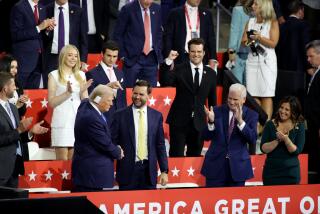McCain’s reach
- Share via
In accepting his party’s nomination for president Thursday night, John McCain didn’t need to rally the Republican ranks against his Democratic opponent. That mission was effectively and engagingly accomplished the night before by his running mate, Alaska Gov. Sarah Palin. The self-described pit bull with lipstick savaged Barack Obama with a smile, offering McCain an opportunity to move beyond partisan point-scoring to outline a governing agenda that would appeal to moderate Republicans, Democrats, independents and Americans of all affiliations afflicted with Bush fatigue.
His speech did that. But the overarching theme was not substance but process. McCain made two pledges: A McCain-Palin administration would move beyond “constant partisan rancor” to “fix problems that need to be fixed,” and it would be the scourge of self-dealing politicians, lobbyists and special interests.
McCain’s emphasis on ethics and transparency comes naturally to him. It also reflects the reality -- which he conceded -- that voters ended Republican control of Congress in 2006 because of scandals suggesting that Washington outsiders had become avaricious insiders. But process only goes so far. The weightiest decisions confronting a president -- and Congress, for that matter -- involve more than a commitment to probity and openness.
To his credit, McCain addressed some of those issues in ways that distinguished him from Obama. He promised to create jobs by opening foreign markets for American goods and services, a contrast to the protectionism with which Obama and other Democrats have been dangerously flirting. He called for government intervention to retrain and compensate workers displaced by globalization. He portrayed tax cuts, not higher taxes on higher income brackets, as an engine of economic growth. He advocated, in general terms, a program to make it easier for families to obtain private health insurance.
As Obama did in his acceptance speech, McCain promised a comprehensive approach to energy independence -- but one in which drilling for new oil and nuclear power play a central role. He promised to promote a “culture of life” and coupled that with a commitment to appoint judges who “don’t legislate from the bench.” Together, those pledges amounted to a declaration of war on legal abortion.
McCain deserves credit for infusing what could have been a purely rhetorical exercise with policy prescriptions. Yet this litany was notable also for what it omitted. Where was the robust defense of comprehensive immigration reform, perhaps the most dramatic example of McCain’s ability to work with Democrats and infuriate Republican conservatives? Where was a specific blueprint for reform to prevent future collapses in the home mortgage market? Where was the full-throated renunciation of the torture of suspected terrorists that distinguishes McCain from the morally myopic policies of the Bush administration?
It is peculiar, and depressing, that a candidate who emphasizes his role as a maverick would de-emphasize examples of his independence that might discomfit the conservative true believers in his audience.
More to Read
A cure for the common opinion
Get thought-provoking perspectives with our weekly newsletter.
You may occasionally receive promotional content from the Los Angeles Times.






